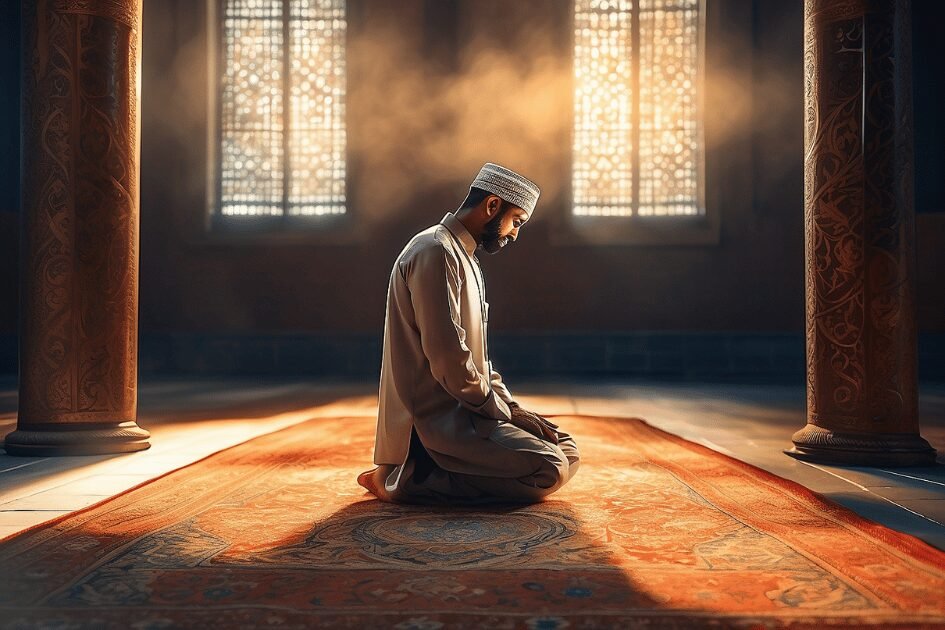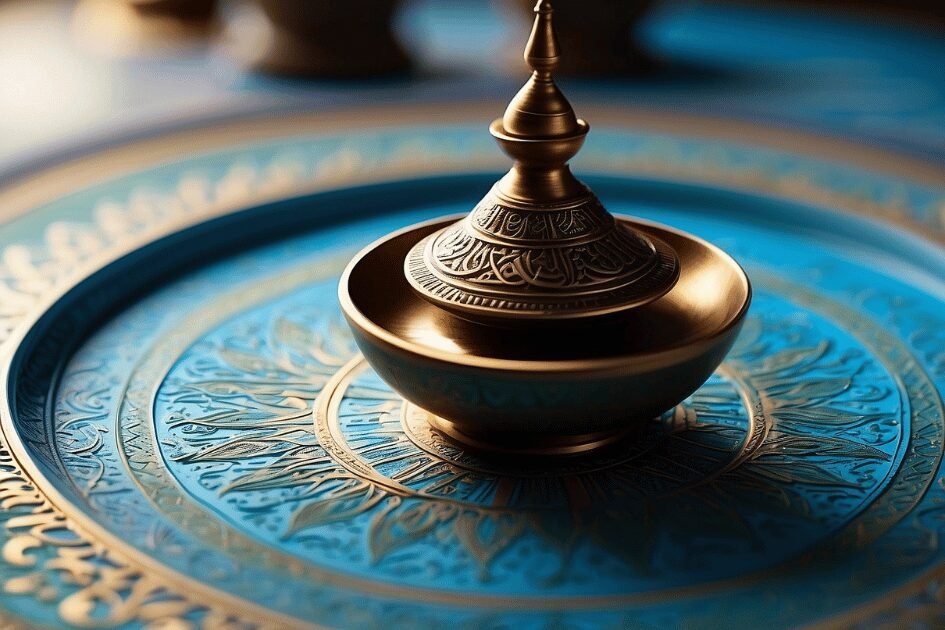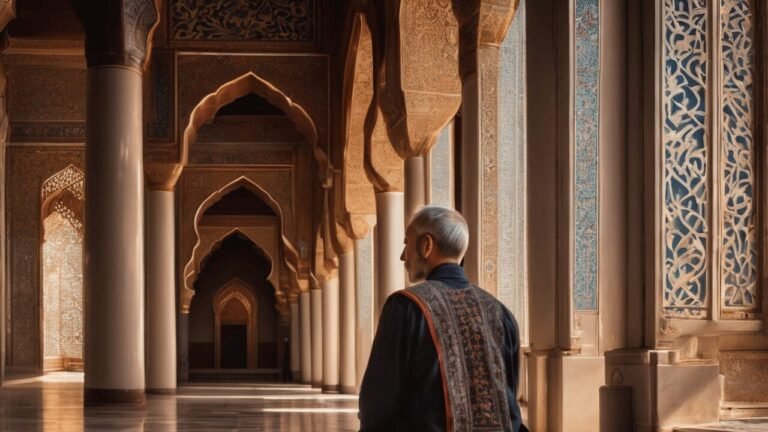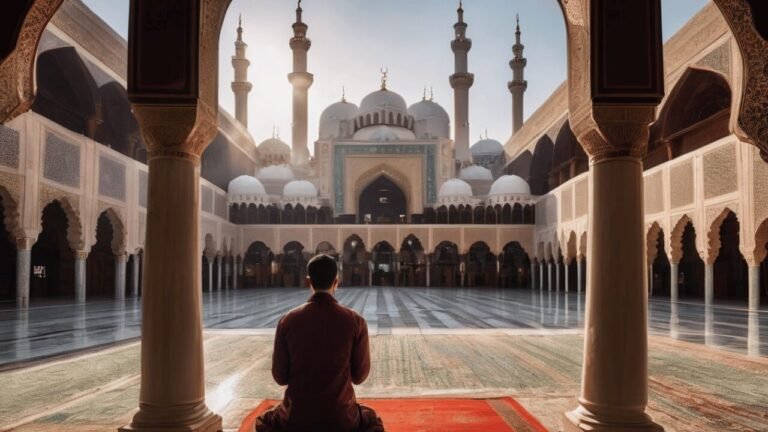Did you ever ask yourself the question, what is Salah?
Salah, also known as prayer, is one of the most important pillars of Islam. It is a form of worship that all Muslims are required to perform daily. Salah is considered a means of communication between you and Allah, and it is an act of submission and devotion. It involves specific physical movements, recitation of verses from the Quran, and supplications.
Salah holds immense significance in your life as it helps to establish a strong connection with Allah, seek forgiveness, and seek His guidance. It is an integral part of your daily life and vital to your spiritual growth.
Key Takeaways:
- Salah is an essential pillar of Islam that all Muslims are required to perform daily.
- It is a means of communication between the individual and Allah, fostering a strong connection and seeking guidance.
- Salah involves physical movements, Quranic recitation, and supplication.
- It holds immense significance in a Muslim’s life, promoting spiritual growth and seeking forgiveness.
- Regular performance of salah helps establish discipline, self-control, gratitude, and humility.
Table of Contents
The Structure of Salah: How to Perform the Five Daily Prayers

It is very important for Muslims to learn how to pray in Islam. Salah comprises five daily prayers: Fajr, Dhur, Asr, Maghrib, and Isha. Each prayer has a specific time of the day when it will be performed. The structure of salah involves both physical and verbal actions that demonstrate devotion and submission to Allah.
To begin salah, you must first make the intention to pray. This intention should be made in your heart and not verbalized. Afterward, performing ablution (wudu) is necessary to purify yourself before prayer. Ablution involves washing specific body parts, such as hands, face, and feet, with clean water.
The prayer is initiated by raising your hands to the level of your ears and saying “Allahu Akbar,” which means “Allah is the Greatest.” This phrase signifies the beginning of your connection with Allah. Throughout the prayer, you will recite verses from the Quran, including Surah Al-Fatiha, the opening chapter of the Quran, and additional short verses.
Physical movements are an integral part of salah. These include bowing (ruku), prostration (sujud), and sitting (tashahud). During bowing, you bend from the waist, placing your hands on your knees. Prostration involves placing your forehead, nose, hands, knees, and toes on the ground. At the same time, sitting is done by resting on your left buttock with your right foot upright and your hands resting on your thighs.
The prayer concludes with the tasleem, where you offer greetings of peace to the right and left sides by turning your head while saying “As-salamu alaikum wa rahmatullah” (Peace be upon you and the mercy of Allah). This signifies the end of the prayer.
| Prayer Name | Time of Day |
|---|---|
| Fajr | Before sunrise |
| Dhur | After midday, before the sun begins to decline |
| Asr | Afternoon until just before sunset |
| Maghrib | Just after sunset |
| Isha | After twilight until before dawn |
The structure of salah is based on the guidance found in the Quran and the teachings of Prophet Muhammad. By following these guidelines, Muslims can perform their daily prayers in a manner that fosters a deeper connection with Allah and enhances their spiritual journey.
The Importance of Salah in the Life of a Muslim

Salah, or prayer, is crucial for Muslims. It establishes a direct connection with Allah, seeking guidance and forgiveness. It is a spiritual practice that purifies the heart and soul, increases mindfulness, and strengthens one’s faith.
Salah has benefits beyond worship. It develops discipline, self-control, gratitude, and humility, reminding us of life’s purpose and the goal of worshipping Allah. Muslims can seek forgiveness, blessings, and guidance from Allah through salah, making it a source of peace, tranquility, and spiritual fulfillment.
Salah is not merely a ritualistic practice but an integral part of a Muslim’s daily life. It is a constant reminder of their commitment to Allah and their devotion to living a righteous life. By establishing a routine of performing salah five times daily, Muslims create a structured framework for their day, balancing their worldly responsibilities with their spiritual obligations. Through salah, Muslims find solace, strength, and a sense of belonging in the Muslim community.
The Benefits of Salah in Daily Life

Salah provides numerous benefits to a Muslim’s daily life. It is a practice that helps manage stress, brings inner peace, and promotes overall well-being. Muslims find solace and rejuvenation by taking a break from their daily activities and dedicating time to connect with their Creator. Salah also encourages self-reflection and introspection, allowing individuals to evaluate their actions and align them with the teachings of Islam.
Furthermore, salah fosters a sense of unity and community among Muslims. When Muslims pray together in congregational prayers, they create a bond of brotherhood and sisterhood, strengthening the ties within the Muslim community. This communal aspect of salah provides support, encouragement, and a sense of belonging.
In addition, salah is a reminder of this world’s transient nature and the importance of prioritizing the hereafter. It helps individuals maintain perspective and focus on their ultimate goals, motivating them to lead a righteous life and seek success in this world and the hereafter.
The Role of Salah in Spiritual Growth

Salah is instrumental in the spiritual growth of a Muslim. It is a consistent and regular practice of connecting with Allah, seeking His guidance, and seeking forgiveness for past mistakes. The performance of salah helps individuals develop a deep sense of spirituality, enabling them to overcome challenges, find inner peace, and cultivate a strong relationship with Allah.
Muslims learn patience, perseverance, and trust in Allah’s plan through salah. It serves as a reminder that success and fulfillment come from obedience to Allah and His teachings. By incorporating salah into their daily lives, Muslims can become more mindful, grateful, and spiritually aware, fostering personal growth and development.
The importance of salah in the life of a Muslim cannot be overstated. It is a practice that provides numerous benefits to the individual, the community, and the overall spiritual well-being. By establishing a strong connection with Allah through salah, Muslims can seek guidance, find peace, and lead a life of righteousness.
Common Mistakes to Avoid in Salah
Be aware of common mistakes during salah to ensure it’s done correctly and in line with Islam’s teachings. Here are some common mistakes to watch out for:
Rushing through the prayer
One common mistake is rushing through the prayer without giving each action its due attention and focus. It’s essential to take your time and perform each movement deliberately, with humility and presence of mind. Remember, salah is a spiritual act of worship, and it should be approached with reverence and mindfulness.
Incorrect performance of physical actions
Another common mistake is not properly performing the physical actions of salah, such as bowing (ruku) and prostrating (sujud). It is important to learn the correct postures, positions, and movements from reliable sources and strive to perform them accurately. Incorrect performance of these actions can impact the validity of your prayer.
If you are new to Islam and need assistance with your prayers, be sure to read our article on the best interactive prayer mat to learn more.
Reciting incorrect verses
Reciting the correct verses from the Quran is an integral part of salah. It is crucial to learn and memorize the verses that are recited during each part of the prayer. Reciting the wrong verses or making mistakes in the recitation can affect the correctness of your salah. Study and understand the verses you recite to deepen your connection with Allah during salah.
Lack of focus and mindfulness
One of the most common mistakes is not maintaining focus and mindfulness throughout the prayer. It is important to concentrate on the words being recited, the meanings behind them, and the presence of Allah. Avoid distractions and strive to engage fully in the act of worship.
Remember, if you make a mistake during salah, it can be rectified by performing the necessary actions to correct it. Seek knowledge and guidance from qualified sources to complete your salah correctly. By avoiding these common mistakes and striving for excellence in your salah, you can enhance the spiritual experience and connection with Allah.
Conclusion

Salah, also known as prayer, is a fundamental aspect of Islam that plays a vital role in the lives of Muslims. This form of worship allows you to establish a direct connection with Allah, seek His guidance, and find forgiveness. Salah consists of specific physical movements, recitation of verses from the Quran, and supplications.
Performed five times a day, salah serves as a reminder of the purpose of life and the ultimate goal of worshipping Allah. It helps strengthen your faith, develop discipline, and cultivate spiritual growth. Observing salah regularly can purify your heart and soul, increase mindfulness, and gain a sense of peace and tranquility.
As a Muslim, salah is essential to your devotion to Allah and commitment to living a righteous life. Through salah, you can seek blessings, find purification, and experience spiritual fulfillment. Embrace salah prayer to strengthen your connection with Allah and enrich your life as a believer in Islam.
FAQ
What is salah?
Salah, also known as prayer, is one of the most important pillars of Islam. It is a form of worship that all Muslims are required to perform daily.
What is the structure of salah?
The structure of salah involves specific physical and verbal actions. Salah consists of five daily prayers: Fajr, Dhuhr, Asr, Maghrib, and Isha. Each prayer has a specific time of the day when it will be performed.
Why is Salah important?
Salah is important because it establishes a direct connection with Allah and seeks His guidance, forgiveness, and blessings. Salah helps to purify the heart and soul, increase mindfulness, and strengthen one’s faith.
What are some common mistakes to avoid in salah?
Some common mistakes include rushing through the prayer, not correctly performing physical actions such as bowing and prostrating, not reciting the correct verses from the Quran, and not focusing on intention and mindfulness.







